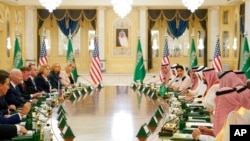The Biden administration is nearing a decision point on whether go ahead with a bilateral arms and security agreement with Saudi Arabia or hold off in hopes of eventually pairing it with a long-sought trilateral deal to normalize Saudi-Israeli relations.
For now, administration officials say nothing can go forward until all the parts of the puzzle are in place, but with the Israel-Hamas war standing in the way of a normalization agreement, some analysts are arguing for an early bilateral deal that would help check Chinese influence in the region.
The terms of the U.S.-Saudi agreement have not been made public, but Reuters quoted foreign diplomats in the Gulf and sources in Washington earlier this month saying it calls for formal U.S. guarantees to defend the kingdom as well as Saudi access to more advanced U.S. weaponry. Other reports say it may include support for the kingdom’s nuclear energy program.
The kingdom, in return, would halt Chinese arms purchases and restrict Beijing’s investment in the country, Reuters said.
State Department spokesperson Matthew Miller confirmed at a May 3 briefing that the two countries are “very close to reaching an agreement on the bilateral pieces” of the deal. “There are a few details that we have to continue to work through, but we think we can reach agreement on those details in very short order.”
But, he acknowledged, “there is still more work to be done on a separate piece of that, which is the proposal for a pathway to a Palestinian state. … Saudi Arabia has made very clear that as part of any normalization deal with Israel, they have two requirements: one, calm in Gaza, and two, a path to an independent Palestinian state.”
Pressed on whether the Biden administration was considering moving ahead with the U.S.-Saudi agreement separately, Miller said that had not been discussed. “We have been very clear, Saudi Arabia has been very clear that this is a package deal that would include a bilateral component and also include a path to two states.”
In a May 8 column for Foreign Affairs magazine, however, a senior fellow at the Council on Foreign Relations argued that a trilateral deal is not in America’s interests because it would make U.S.-Saudi relations dependent on future ties between Tel Aviv and Riyadh.
“If a U.S. commitment to Saudi Arabia is contingent on Saudi normalization with Israel, it is likely that the quality of those ties — i.e., Israeli-Saudi relations — will impose themselves on the bilateral relationship between Washington and Riyadh, in both obvious and not so obvious ways,” wrote Steven A. Cook, the council’s senior fellow for Middle East and Africa studies.
“If the Biden administration wants a defense pact with Saudi Arabia, let’s have one. There should be a good enough case, and the president is a skilled enough politician to persuade the skeptics,” he concluded.
Joshua Landis, head of the Center for Middle East Studies at the University of Oklahoma, expressed a similar view in an interview with VOA, highlighting several advantages to a more limited agreement.
“For the U.S., it limits China's investment in Saudi Arabia and ensures that the U.S. maintains its dominant security relationship,” he said. “For Saudi Arabia, it provides access to more advanced U.S. weaponry in exchange for halting Chinese arms purchases and restricting Beijing's investment in the country.”
But Anna Jacobs, a senior gulf analyst at the International Crisis Group based in Doha, Qatar, told VOA that a bilateral deal, while appealing to Saudi Arabia, would likely be “a non-starter” for the Biden administration, which has long sought the breakthrough in Israel-Palestinian relations that would come with a normalization deal.
“It makes complete sense for Riyadh to try and secure a bilateral deal with the U.S. while leaving out the Israel component. Normalization with Israel is extremely unpopular in Saudi Arabia and across the region, making it a major political risk for Riyadh, especially as the Gaza war rages on," she told VOA.
"This plan B option would significantly lower the risks for Saudi Arabia and would give them everything they want from the U.S. without having to give much in return. But this plan B option wouldn’t work for the U.S. and isn’t likely to go anywhere," she added.
Nancy Okail, president and CEO of the Washington-based Center for International Policy, argued against the U.S.-Saudi agreement with or without the broader Saudi-Israel component.
She told VOA that the defense deal primarily serves the interests of Saudi Crown Prince Mohammed bin Salman, who has been lauded for modernization efforts but “has also faced criticism for numerous human rights violations, maintaining oppressive governance, and suppressing dissent, exemplified by the killing of [Washington Post columnist] Jamal Khashoggi.”
She said agreements like the one being negotiated “operate under the flawed notion that increased arms lead to greater security, yet history shows that such influxes have instead fueled conflicts and triggered an arms race.”




